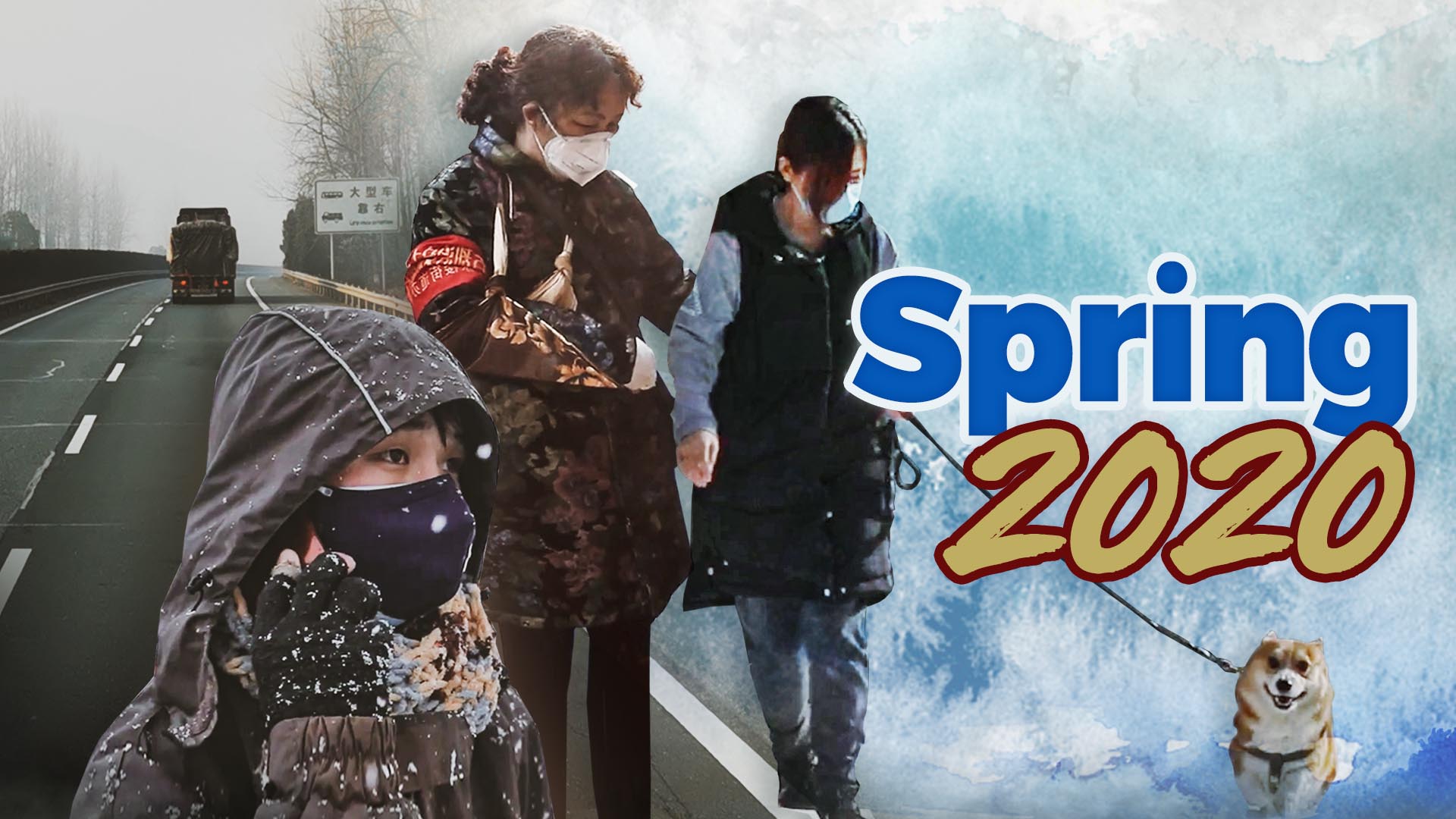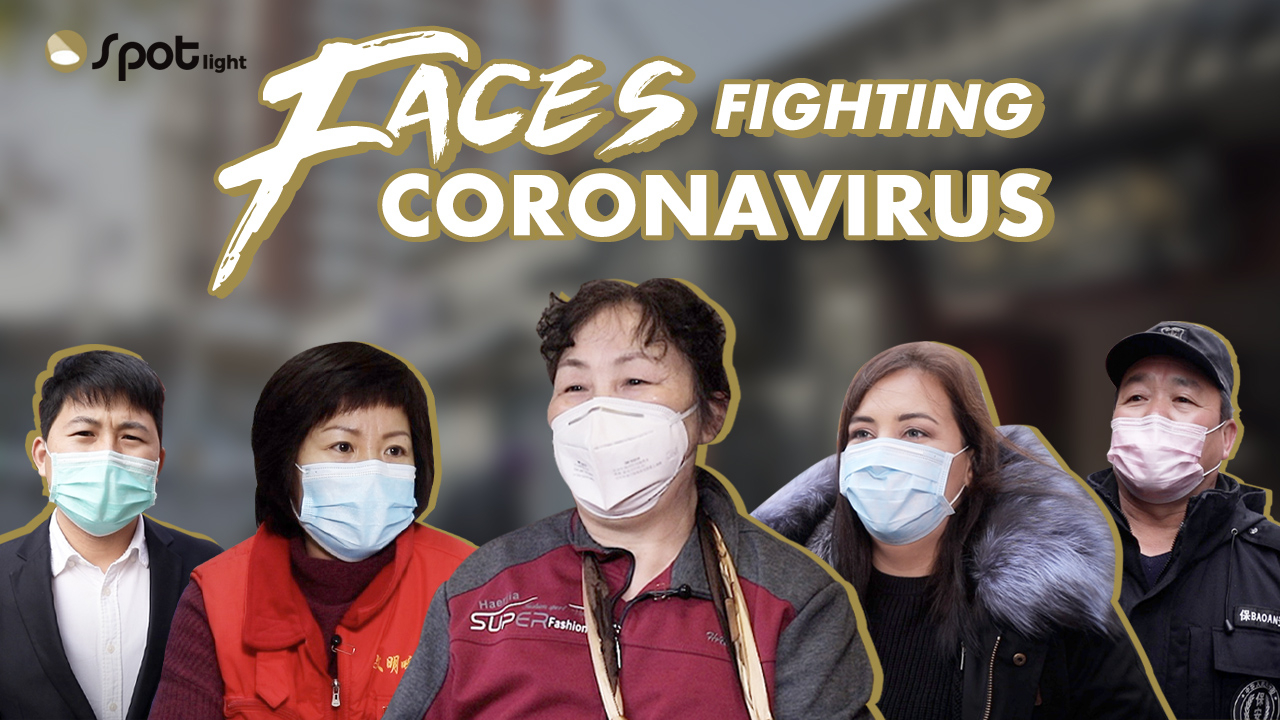
Editor's note: This is the first article in a year-end series of reporter's diaries, which documents our footprints across China in this extraordinary year immobilized by fear, grief, and love.
Though life is slowly returning to normal in China, it's easy to forget how difficult it was during the earliest days of the coronavirus lockdown. Normally bustling restaurants stopped serving, around-the-clock convenience stores were closed, and the streets became lifeless. Since residential compounds didn't allow visitors to curb the spread of the virus, many residents were cooped up in their homes.
It was during these dark moments that we realized that heroes can come in any shape or size – under-appreciated yet essential roles in the cities such as delivery drivers and street cleaners kept society from crumbling under the weight of fear and paranoia.
I had the good fortune to talk with some of these frontline workers in Beijing. Some of them are always on the road, such as a delivery man who kept an urban village in Beijing supplied, a trucker who drove hundreds of miles delivering essential goods when few would, and a retired woman who volunteered to safeguard an old residential compound.
03:22

In February, the relentless novel coronavirus was on the verge of a massive outbreak as cases started appearing in many countries. There were few people in sight in the street, for fear of the unknown, except for a handful of deliverymen riding their mopeds throughout the city.
"I'm not fearless," said Yao Pengpeng, a courier deliveryman covering southeastern Beijing. "Especially knowing that my running around would put my three-year-old kid, who has a vulnerable immune system, at risk of catching the virus."
I met Yao on a cold and snowy day. Together with a videographer, we went to the 25-year-old's courier station, slipping and sliding. He had been working there for 20 days straight by Valentine's Day. Spending seven years working around in Beijing, that was the first time that he missed the chance to head back home in central China's Henan Province during the annual Spring Festival.
Yao serves some 1,700 households in a suburban area inhabited by local villagers and migrant workers working toward a better life in this metropolis. Since the coronavirus outbreak in late January, he delivered packages to 80 households each day on average. That was a 20-percent drop from usual, but he was much busier. After arriving at the station at 7:30 in the morning, he started unloading, sorting, checking addresses and loading goods to the brim onto his three-wheeled motorcycle. Then a 10-hour-long shift began.
We followed him to a few of his customers, watching him disinfecting the packages, consulting with customers over designated delivery times and locations, and having his body temperature checked at every entrance to a residential compound. The "no-touch delivery" measure made his work more complicated while making it much safer for his customers. Some of his colleagues quit because they were afraid of catching the virus; after all, they had to come into contact with numerous goods every day. But he chose to stay. "I can't leave my customers hanging."
03:32

Like Yao, Qu Shenghua, a father of two, was on the road for 70 days straight until early April when the lockdown on the then ground zero city of Wuhan was lifted. On the second day of the Spring Festival holiday, the native of northern Hebei took up his old trade as a truck driver and set out to Wuhan with a carriage filled with shipments ranging from vegetables to masks to medical equipment.
It was a grind, not from working, cooking, eating and sleeping in the truck, but from accusations that truckers were charging prohibitive prices during the outbreak. "But when a doctor gave me a lunch box while I was unloading medical supplies at a designated hospital, I realized that everything was worth it," he told us after coming back home.
03:30

The outbreak began in the middle of winter, which made reporting in the bitter cold of Beijing a daunting task. Though bone-chilling winds whipped my colleague and me in the face, I shouldn't have complained, given that we interviewed Zhao Lirong, a 66-year-old retiree who had volunteered to stand guard in her neighborhood to prevent non-residents from entering the compound in compliance with COVID restrictions. She and others of her age on her neighborhood watch committee had to check temperatures of residents entering the complex and scan their health QR codes to track whether they've been to at-risk regions. Zhao had even slipped and broken her wrist, yet continued to work on her 10-hour shift.
It was also the fear of the unknown – fear of a new disease and how long the lockdown would be – that caused many to act irrationally. There were numerous reports of people throwing pet cats and dogs out of the window or burying the animals alive because some suspected the novel coronavirus could be spread by the animals.
03:30

At the time, we went onto the streets, empty and deserted, hoping to find a pet store that adopted those abandoned furry friends. We walked to an area known for a widespread layout of pet shops and hotels.
Finally we found one where there was an abandoned cat. Named Paomian, which means "instant noodles" in English, the small, slim cat looked at us fretfully. "I can't reach her owner. I discovered I was blacklisted [by the owner] days ago," Fang Wenwen said.
Fang was a manager of one of those pet hotels. At a time when many people went home for the Spring Festival, they left their beloved "family members" under her care. Unfortunately for Fang, the sudden travel restrictions due to COVID stranded many pet owners in their hometowns. On top of missing her annual family reunion, Fang had to sleep at the pet hotel, constantly sending pictures and updates to concerned pet owners on her smartphone and taking care of abandoned pets.
Later the World Health Organization (WHO) stated that there is no evidence to show that companion animals or pets, such as dogs and cats, can be infected with the virus, but panic lingered. "Every life should be treated equally," Fang said. In these tough times, their companionship grew to be more important than ever.
Although life in China has largely returned to normal, the memories of these people and others who continued to do their jobs in a time of great need have helped us greatly on the road to recovery.

